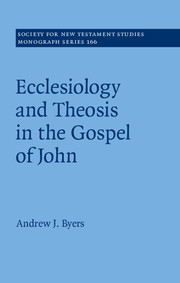Crossref Citations
This Book has been
cited by the following publications. This list is generated based on data provided by Crossref.
Southgate, Christopher
2018.
Theology in a Suffering World</I>.
2018.
Books Received.
Horizons,
Vol. 45,
Issue. 1,
p.
240.
Blumhofer, Christopher
2019.
The Gospel of John and the Future of Israel.
Cho, Dongsun
2019.
Deification in the Baptist Tradition: Christification of the Human Nature Through Adopted and Participatory Sonship Without Becoming Another Christ.
Perichoresis,
Vol. 17,
Issue. 2,
p.
51.
Thomaskutty, Johnson
2022.
Oneness in John 17:1–26 as a paradigm for wider ecumenism and dialogue.
HTS Teologiese Studies / Theological Studies,
Vol. 78,
Issue. 3,
Ferries, Ryan A.R.
2022.
Pauline and Johannine Theosis.
HTS Teologiese Studies / Theological Studies,
Vol. 78,
Issue. 4,
Saputra, Brury E.
2022.
The Jewish background of the oneness language in John’s Gospel.
HTS Teologiese Studies / Theological Studies,
Vol. 78,
Issue. 4,
McDowell, Michael T.
2022.
An Insider’s Church for Outsiders: The Johannine “Come and See” Passages and Christian Engagement with the World.
Religions,
Vol. 13,
Issue. 9,
p.
865.
Lee, Dorothy A.
2022.
Jesus’ Spirituality of [Af]filiation in the Fourth Gospel.
Religions,
Vol. 13,
Issue. 7,
p.
647.
Kim, Kangil
2023.
Participation “In the Heavenlies” in Christ: Deification in Ephesians.
Religions,
Vol. 14,
Issue. 6,
p.
784.
Byers, Andrew J.
2023.
The Genre of Mark’s Gospel Is ‘Gospel’: Reconsidering Literary Innovation in the Markan Incipit.
Journal for the Study of the New Testament,
Vol. 46,
Issue. 2,
p.
168.
Reardon, Michael M. C.
2023.
Becoming god: Interpreting Pauline soteriology as deification.
Currents in Biblical Research,
Vol. 22,
Issue. 1,
p.
83.
Hase, Luke
2024.
That We Might Die with Him: Jesus’s Death and Resurrection as a Paradigm for Discipleship in Jn 11.1–12.11.
Journal for the Study of the New Testament,
Vol. 46,
Issue. 3,
p.
294.



